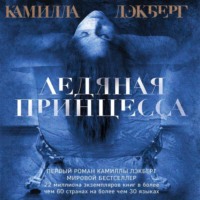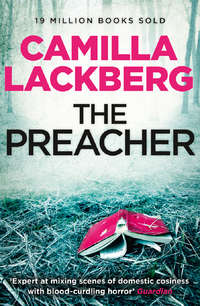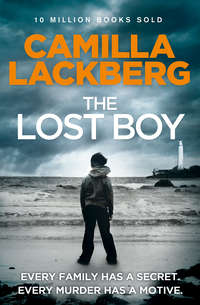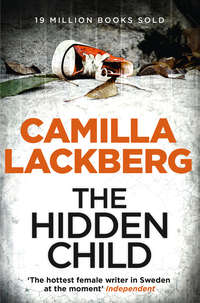
Полная версия
The Girl in the Woods
‘Okay,’ said Anna. ‘I can watch the kids for you. How long will you be gone?’ She laughed when she saw Erica’s embarrassed expression.
‘Could I drop them off again around three? Patrik wants me to come over to the station to tell them about the Stella case. I have to be there at three thirty. So I should be back here by five or five thirty. Will that work?’
‘That’s fine,’ said Anna. ‘Your kids are better behaved with me than with you.’
‘Oh, come on,’ said Erica, blowing her sister a kiss.
But it couldn’t be denied that Anna had a point. The children had behaved like angels.
‘What do you think they’re scared of?’
Sam realized he had started to slur his words. The combination of sun and champagne had gone straight to his head. He was holding the glass in his left hand. His right hand ached after the morning’s target practice.
‘Scared of?’ said Jessie.
She too was slurring her words. She’d had several glasses before he arrived and they were now on the second bottle.
‘Won’t your mother notice some bottles are missing?’ he asked, motioning with the glass.
The golden bubbles sparkled when the sunlight hit the glass. He’d never thought about how beautiful champagne was. On the other hand, he’d never seen it close up.
‘Oh, don’t worry. She won’t care,’ replied Jessie, tossing her head. ‘As long as there’s still some left for her.’
She reached for the bottle.
‘But what did you mean about being scared? I don’t think they’re scared of us.’
‘Of course they’re fucking scared,’ said Sam, holding out his glass.
The foam reached the top and spilled over the rim, but he merely laughed and licked the champagne off his hand.
‘They know we’re not like them. They sense … they can sense the darkness inside us.’
‘Darkness?’
She studied him in silence. He loved the contrast between her green eyes and blond hair. He wished she would realize how beautiful she was. He looked beyond her weight and the spots. He had recognized himself in her when he saw her at the Centrum kiosk. He knew they both shared that lost feeling. And he saw in her the same darkness.
‘They know we hate them. They see all the hatred they’ve already created in us, but they can’t help themselves, they keep pouring it on, keep creating something they won’t be able to control.’
Jessie giggled.
‘My God, you sound so pretentious. Skål! We’re sitting here in the sunshine, on the dock next to a luxury villa, we’re drinking champagne, and we’re having a fucking great time.’
‘You’re right.’ He smiled as their glasses clinked. ‘We’re having a fucking great time.’
‘Because we deserve it,’ Jessie said, stumbling over her words. ‘You and me. We fucking deserve it. We’re better than them. They’re nothing compared to us.’
She raised her glass so abruptly that half the champagne spilled out, landing on her bare stomach.
‘Oops,’ she said, giggling.
She reached for a towel, but Sam stopped her. He looked around. The dock was hidden by a fence, and the boats out in the water were a good distance away. They were alone in the world.
He knelt down in front of her, between her legs. She looked down at him with excitement. Slowly he licked the champagne off her skin. He sucked up the bubbly that had filled her navel and then ran his tongue over her sun-warmed skin. She tasted of champagne and sweat. He raised his eyes and looked at her. Keeping his eyes fixed on hers, he reached for the edge of her bikini bottoms and slowly pulled them down. When he began licking her, he heard her panting breaths mixing with the sound of the seagulls screeching overhead. They were alone. All alone in the world.
THE STELLA CASE
Leif Hermansson took a deep breath before he stepped inside the small interview room at the police station. Helen Persson and her parents, KG and Harriet, were waiting inside. He knew the parents – everyone in Fjällbacka did – though they were no more than chance acquaintances. It was different with Marie Wall’s parents. The police in Tanumshede had had countless opportunities to meet them over the years.
Leif wasn’t happy about being police chief. He didn’t enjoy supervising others or having to make the decisions. But he was too good at his job, and it had got him promoted. Of course it was only the police station in Tanumshede; he had politely but firmly turned down all opportunities that would have meant moving somewhere else. He had been born in Tanumshede, and that was where he intended to stay until the very end.
Days like today made him hate being the boss. The responsibility of having to find the perpetrator, male or female, who had killed a little girl, rested heavily on his shoulders.
He opened the door to the dreary room with the grey-painted walls, allowing his eyes to rest for a moment on Helen’s slumped figure as she sat at the table. Then he nodded to Harriet and KG, seated on either side of their daughter.
‘Is it really necessary for us to have this talk here at the station?’ asked KG.
He was chairman of the Rotary Club and a big shot within the local business community. His wife Harriet was always impeccably dressed, with her hair styled and her nails exquisitely manicured. But Leif had no idea what she did with her time other than taking care of her appearance and attending meetings of the Home and School Association. She always seemed to be at KG’s side at various functions and parties, always laughing and with a martini in her hand.
‘We thought it would be easier for you to come to us,’ said Leif, signalling an end to that discussion.
How the police chose to do their job was their own concern, and he had a feeling that KG would try to take over if he didn’t keep tight control of the conversation.
‘It’s the other girl you should be talking to,’ said Harriet, tugging at her freshly ironed white blouse. ‘Marie. She comes from that dreadful family.’
‘We have to talk to both girls, since all indications are that they were the last ones to see Stella alive.’
‘But Helen has nothing to do with this. Surely you understand that.’
KG was so indignant, his moustache quivered.
‘We’re not saying they had anything to do with the girl’s death, but they were the last ones to see her, and we need to go over the chain of events if we’re going to find the perpetrator.’
Leif glanced at Helen. She was sitting in silence, staring down at her hands. She had dark hair like her mother. She was pretty in a quiet, ordinary sort of way. Her shoulders were tensed, and she was plucking at her dress.
‘Helen, can you tell me in your own words what happened?’ he said gently, surprised to feel a certain tenderness for the girl.
She looked so vulnerable and frightened, and her parents seemed much too focused on themselves to notice their daughter’s terror.
Helen glanced at her father, who nodded curtly.
‘We promised Linda and Anders to babysit Stella. We live nearby, and sometimes we go over there to play with Stella. They said they’d give us twenty kronor so we could go to the kiosk with Stella and buy ice cream.’
‘When did you pick her up?’ asked Leif.
The girl looked up at him.
‘I think it was around one. I went over there with Marie.’
‘Marie,’ snorted Harriet, but Leif raised his hand to silence her.
‘So it was around one o’clock.’
Leif jotted down the time in the notebook in front of him. The tape recorder was silently running in the background, but taking notes helped him to organize his thoughts.
‘Yes, but Marie would know better than me.’
Helen shifted position.
‘Who was at home when you picked her up?’
Leif stopped writing and smiled at Helen, but she still refused to meet his eye as she picked invisible lint off her white summer dress.
‘Her mother. And Sanna. They were about to leave when we got there. She gave us the money so we could pay for the ice cream. Stella was really happy. She was jumping up and down.’
‘Did you leave at once? Or did you stay at the farm for a while?’
Helen shook her head and a lock of her dark hair fell into her face.
‘We played on the farm. Jumped rope with Stella. She likes it when we each take one end of the rope so she can jump. But she kept stumbling and getting tangled up, so we got tired of the game.’
‘What did you do then?’
‘We took her with us and walked to Fjällbacka.’
‘That must have taken quite a while.’
Leif made a quick calculation. It would take him personally about twenty minutes to go from the Strand farm to the centre of town. With a four-year-old in tow, it would take much longer. The child would want to smell the grass and pick flowers and then she’d get a pebble in her shoe, or she’d have to pee, and her legs would get so tired that she wouldn’t want to go any further. Walking from the farm to Fjällbacka with a four-year-old would take for ever.
‘We took a pushchair with us,’ said Helen. ‘The kind you can fold up so it gets really small.’
‘A collapsible pushchair,’ said Harriet.
Leif gave her a look that stopped her from saying anything else.
Helen cast a quick glance at her mother.
Leif put down his pen.
‘So how long did it take you to get there? With Stella in the pushchair.’
Helen frowned.
‘It took ages. It’s a gravel road up to the main road, and it’s hard to steer a pushchair on gravel. The wheels kept getting stuck.’
‘But approximately how long did it take?’
‘Maybe forty-five minutes? But we didn’t check the time. We don’t have watches.’
‘You do have a watch,’ said Harriet. ‘You just refuse to wear it. But I’m not surprised that other girl doesn’t have one. If she did, it probably would have been a stolen watch.’
‘Mamma! Don’t say that!’
Helen’s eyes flashed.
Leif looked at Harriet.
‘If you don’t mind, let’s stick to the matter in hand.’
He nodded at Helen.
‘Then what? How long did you stay in Fjällbacka with Stella?’
Helen shrugged.
‘I don’t know. We bought ice cream and sat on the wharf for a while, but we didn’t let Stella go near the edge because she can’t swim, and we didn’t have any life jackets with us.’
‘Very smart,’ said Leif with a nod.
He made a note to speak to Kjell and Anita who owned the kiosk to see if they recalled seeing the girls and Stella yesterday.
‘So you ate your ice cream and sat on the wharf. Did you do anything else?’
‘No. After a while we started walking back. Stella was tired. She fell asleep in the pushchair.’
‘So you spent about an hour in Fjällbacka? Does that sound right?’
Helen nodded.
‘Did you go the same way back?’
‘No, on the way back Stella wanted to go through the woods, so she got out of the pushchair and we walked the rest of the way through the woods.’
Leif jotted down a few notes.
‘And when you got back, what time do you think it was?’
‘I don’t know, but it took about the same amount of time to walk home.’
Leif looked down at the notes he’d written. If the girls arrived at the farm around one, played for twenty minutes or so, then walked to Fjällbacka in forty minutes, spent an hour there and then walked back in forty minutes, it would have been about 15.40 when they got home. Although considering Helen’s less than precise sense of time, he couldn’t rely on that, so he wrote ‘15.30–16.15’ in his notebook and drew a circle around it. Even that time frame might not be reliable.
‘What happened once you got home with Stella?’
‘We saw her father’s car in the yard, so we assumed he was home. And when we saw Stella running towards the house, we left.’
‘But you didn’t see her father? You didn’t see her go inside the house?’
‘No.’
Helen shook her head.
‘Did the two of you go straight home?’
‘No …’
Helen glanced at her parents.
‘What did you do?’
‘We went over to the lake behind Marie’s farm and went swimming.’
‘We’ve told you before you’re not allowed—’
A look from Leif stopped Harriet.
‘About how long were you there?’
‘I don’t know. But I was home for dinner at six.’
‘Yes, she was,’ said KG, nodding. ‘Though she didn’t tell us anything about going swimming. She said they’d been babysitting little Stella the whole time.’
He glared at his daughter, who was still looking down at her dress.
‘Obviously we noticed that her hair was wet, but she said they’d been running through the sprinkler with Stella.’
‘It was stupid to lie. I know that,’ said Helen. ‘But I’m not supposed to go there. They don’t like me to go anywhere with Marie, but that’s just because of her family, and she can’t help who her parents are, can she?’
Again her eyes flashed.
‘That girl is made of the same stuff as her family,’ said KG.
‘She’s just … a little tougher than others,’ said Helen in a low voice. ‘But maybe there’s a good reason for her to be that way. Have you ever thought about that? She didn’t choose to grow up in that family.’
‘Let’s all calm down,’ said Leif, holding up his hands.
Even though their argument told him something valuable about their family dynamics, this wasn’t the right time or place to be airing such matters.
He read aloud from his notes.
‘Does that match more or less what you remember about yesterday?’
Helen nodded.
‘Yes, it does.’
‘And Marie will tell me the same thing?’
For a moment he thought he saw a glimmer of uncertainty in her eyes. Then she replied calmly:
‘Yes, she will.’
Chapter Ten

‘How are you doing?’ asked Paula, giving Martin a searching look as they drove.
He wondered how long everyone was going to keep worrying about him.
‘Things are good,’ he said, surprised to hear that he actually meant it.
His grief at losing Pia would never disappear completely. He would always wonder what their life together might have been, and he’d see her like a shadowy presence at all the important occasions in Tuva’s life. Even at the less important occasions, for that matter. After Pia died, people told him a time would come when he’d be able to enjoy life again. That one day he would feel happy and find himself laughing. That his grief would never go away, but he’d learn to live with it, to walk side by side with his sorrow. At the time, when he was wandering in darkness, it had seemed impossible. In the beginning he frequently seemed to be taking one step forward and two steps back, but after a while it became two steps forward and one step back. Until gradually all movement was forward.
Martin’s thoughts turned to the mother he’d met at the playground yesterday. To be honest, he’d been thinking about her a lot. He realized he should have asked for her phone number. Or at least found out her name. But it was easy to think of things after the event. He’d felt flustered when he realized he’d like to see her again. As luck would have it, they lived in a small community, and he’d been hoping to see her at the playground today. That was his plan, anyway, until Nea was found murdered, and he’d been forced to end his holiday and go back to work.
Guilt flooded over him. How could he be thinking about a woman at a time like this?
‘You look happy, but also a little worried,’ said Paula, as if she’d read his thoughts.
Before he could stop himself, he told her about the woman at the playground. He nearly missed the exit and had to turn the wheel hard to the left.
‘Aha,’ said Paula. ‘She’s so cute you can’t even drive when you think about her!’ She reached for the grab-handle above the car window.
‘You probably think I’m a real idiot,’ Martin said, blushing so much that his freckles were even more noticeable against his pale skin.
‘I think it’s great,’ said Paula, patting his leg. ‘And don’t feel guilty. Life has to go on. And if you’re feeling good, then you’ll do a better job. So find out who she is and give her a call. We’re not going to be able to work round the clock. If we get too tired we’ll only make mistakes.’
‘You’re probably right,’ said Martin, wondering how he should go about finding her.
He knew the name of her son. That was always a start. Tanumshede wasn’t a big place, so he should be able to find her. Provided she wasn’t a tourist just passing through. What if she didn’t even live in the area?
‘Aren’t we going to stop somewhere?’ said Paula as he drove past the first house they’d seen since turning on to the gravel road.
‘What? Oh, sorry,’ he said, blushing again.
‘I’ll help you track her down later,’ Paula told him with a grin.
Martin pulled into the driveway of an old, red-painted house with white trim and lots of gingerbread details. He found himself sighing from sheer envy. This was exactly the sort of house he’d dreamed of owning. He and Pia had been saving up for a house, and had almost scraped together enough for a down payment. Every evening they would search the property websites, and they’d even gone to their first viewing. But then came the cancer diagnosis. The money was still in his savings account. His dream of buying a house had died with Pia, along with all his other dreams.
Paula knocked on the door of the house.
‘Hello?’ she called after a moment.
She glanced at Martin, found the door was unlocked, and stepped into the entryway. In a big city it would have been unthinkable to do such a thing, but here few people ever locked their doors, and friends would often simply go inside. The woman who now came towards them didn’t seem the least bit startled to hear the voices of strangers in her front hall.
‘Oh, hello. Looks like the police are paying me a visit, am I right?’ she said, giving them a smile.
She was so short and tiny and wrinkled that Martin was afraid the draught coming in from the front door might blow her over.
‘Come in. I’m watching the third round between Alexander Gustafsson and Daniel Cormier,’ she said.
Martin gave Paula a puzzled look. He had no clue what the old lady was talking about. He had very little interest in sports. Occasionally he might watch a football match if Sweden was in the semi-finals for the European or world championships, but that was about it. And he knew Paula was even less interested in sports, if such a thing were possible.
‘Whatever it is you want, it’ll have to wait. Have a seat on the sofa,’ the woman told them, pointing at a rose-patterned sofa upholstered in some sort of shiny fabric.
Slowly she lowered herself on to a big wingback chair with a footstool placed right in front of the huge TV. To his surprise, Martin saw that the ‘match’ she was watching consisted of two men in a cage going at each other like crazy.
‘Gustafsson had him in an arm lock in the second round, and Cormier nearly caved, but the bell rang just as he was about to give up. And now in the third round Gustafsson is looking tired, while Cormier is recharged. But I haven’t given up yet. Gustafsson has a fierce fighting spirit, and if he can only get him down on the ground, I think he’ll take it home. Cormier is strongest when he’s on his feet, but not as sharp on the ground.’
Martin found himself speechless as he stared at the woman.
‘Mixed Martial Arts, right?’ asked Paula. ‘MMA?’
The woman looked at her as if she were an idiot.
‘Of course it’s MMA. What did you think it was? Hockey?’
She chuckled. Martin noticed a glass of whisky on the table next to her chair. When I’m her age, he thought, I’m going to treat myself to whatever I want, and whenever I want it, and never mind what might be considered sensible.
‘It’s a title match,’ said the woman, her eyes fixed on the TV. ‘They’re fighting for the world championship. It’s been billed as the match of the year. So you’ll have to excuse me if I can’t give you my full attention right now. I don’t want to miss this.’
She reached for her glass and took a swig of whisky. On the TV screen the big blond guy knocked down the dark-skinned man with the bizarrely wide shoulders and then pounced on top of him. To Martin it looked like an assault that would have earned him several years in jail in real life. And what about those ears? What had those guys done to their ears? They were big and thick and looked like badly shaped lumps of clay. He suddenly understood what people meant by ‘cauliflower ears’ when they talked about fighters.
‘Three minutes to go,’ said the woman, taking another swig of her drink.
Martin and Paula exchanged glances. He could see she was trying hard not to laugh. This was the last thing they’d expected.
Suddenly the woman shouted and leapt up from her chair.
‘YES!’
‘Did he win?’ asked Martin. ‘Did Gustafsson win?’
The blond giant was racing around the cage like a lunatic. He jumped up on the edge and screamed. Apparently, he was the winner.
‘Cormier got beat. He had him in a rear neck choke, and he finally gave up.’
She downed the last of her whisky.
‘Is he the one they’ve been writing about in all the papers? The Mole – isn’t that what they call him?’ asked Paula, looking pleased she’d remembered that much.
‘The Mole? No, he’s called The Mauler!’ the woman snorted. ‘Gustafsson is one of the best in the world. Surely you know that – it’s common knowledge.’
She got up to go to the kitchen.
‘I’m going to make some coffee. Would you like some?’
‘Yes, please,’ said both Martin and Paula.
Having a cup of coffee was part of what they did when they were out talking to people. If they had a lot of interviews in one day, it was sometimes hard to get to sleep at night.
They got up and followed the woman into the kitchen. Martin realized they hadn’t even introduced themselves.
‘Sorry, we didn’t get a chance to tell you our names. I’m Martin Molin, and this is Paula Morales. We’re from the Tanumshede police station.’
‘Dagmar Hagelin,’ said the woman cheerfully as she set a kettle on the hob. ‘Have a seat at the table. It’s more pleasant. I only use the living room when I want to watch TV. I prefer to spend most of my time in here.’
She pointed to the worn wooden table, which was covered with crossword puzzles. Quickly she gathered them all up and set the pile on the window ledge.
‘A workout for the brain. I’ll be ninety-two in September, so I need to keep exercising the old noggin, else dementia will creep in faster than you can say … Oh, er, I forget.’
She laughed merrily at her own joke.
‘How did you get interested in MMA?’ asked Paula.
‘My great-grandson is involved at the elite level. He doesn’t compete in the UFC yet, but it’s only a matter of time. He’s good, and he’s ambitious.’
‘I see. But it’s still a little … um, unusual,’ Paula ventured.
Dagmar didn’t reply at once. She took the kettle off the hob using a crocheted potholder and set it on the table on top of a cork trivet. Then she got out three sweet little cups made of delicate porcelain with a pink pattern and gold rims. She put them on the table and sat down to serve the coffee. Only then did she speak.
‘We’ve always been very close, Oscar and I, so I started going to his matches. And it’s easy to get caught up in the whole thing. You can’t help it. I was quite a successful track-and-field athlete in my younger days, so I can relate to the tension and excitement.’
She pointed to a black-and-white photograph on the wall of a young and sporty-looking woman on her way over the high-jump bar.
‘That’s you?’ said Martin, impressed as he tried to match the image of the tall, slender, and muscular young woman with the tiny, stooped grey-haired granny sitting across from him.









